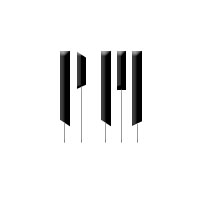How to clean your piano keys – the proper way.
Piano keys can be covered in a variety of materials. The white, natural, keys can be covered in Ivory, celluloid or a number of different plastics. I would recommend using the same method for cleaning any type of covering. The number one rule is ‘do not wet the keys’. The keyboard itself is made from a plank of wood which is then cut using a jigsaw. If any key warps then it may catch on its neighbours, or look uneven; this can be difficult and sometimes impossible to fix. The key coverings are also glued onto the key and some glues can soften if they are in contact with water or solvents.
For regular cleaning…
I would recommend using a clean and slightly damp cloth. Dampen with warm water and wring the cloth out thoroughly so that it leaves no water droplets on the keys. This cloth will remove most dirt and will return the keys to their natural colour. I find that an old cotton sheet cut into 30cm squares does the job very well.
For piano keys that have a build-up of dirt…
Use the same method but rub the cloth on a non-coloured hand soap before cleaning the keys. Imperial Leather soap is ideal for this and is available in many discount stores. Change which part of the cloth you use as it becomes dirty and keep rubbing the soap. As well as cleaning the keys, the soap has the added advantage of leaving a sheen on the keys which repels dirt in the future. You may well have to rub vigorously and for some time, but the results are usually worth it.
If the white natural keys are heavily stained and this method has little effect, consult your piano tuner. This can be remedied but may require the keys to be removed and taken to a workshop.
Sometimes ivory or celluloid keys ‘yellow’ with age.
The best way to reverse this is to expose the keys to sunlight. Sunlight naturally ’bleaches’ ivory and sometimes celluloid type plastics. If you have ivory key coverings, leave the ‘fall’ (the casework part that folds over the keys) open as often as possible to avoid yellowing of the keys. Keeping the keys clean will mean that more sunlight gets to them!
The black ‘sharp’ keys are usually made of ebony or plastic. They can be cleaned using the same method. Be careful with ebony keys though, occasionally they are stained black and this can come off on the cloth leaving a dull ‘off-black’ finish. Try a single key first to check. The sharp keys often have a build-up of dirt on the sides as well as the tops which can be quite thick. Use a scraper made of a material softer than the key top to scrape away this built up dirt. Something like a wooden lollipop stick is ideal. Once this has been removed use a soapy damp cloth as above.
Using wipes to clean piano keys…
During the Covid pandemic, many people, including myself, used wipes to disinfect the key tops. Some people found that wipes occasionally reacted with some plastic key covers especially if wipes were used often (such as in music colleges). If using wipes, make sure that the keyboard is wiped with clean kitchen roll after a few minutes. This allows the chemicals to do their work but not to react with the key covering itself.
To take your keyboard cleaning to the next level, don’t forget the sides of the natural keys. Depress the natural keys in order and wipe the wooden sides of the neighbouring keys with a soapy damp cloth as above. This is extra work but makes a satisfying difference!
Having clean piano keys is vital to maintaining the overall appearance and playability of your instrument. Regular cleaning not only preserves the aesthetic beauty of your piano but also ensures a more enjoyable playing experience. However, deep cleaning and dealing with stubborn stains or yellowing can be challenging and requires a professional touch to avoid damaging the delicate materials.
Want to ensure your piano is in its best condition? Here are 3 ways I can help:
1. Professional Piano Cleaning: I can provide expert cleaning services to restore your keys to their original brilliance without risking any damage.
2. Comprehensive Piano Tuning and Maintenance: Regular tuning is essential to keep your piano sounding its best. I offer thorough tuning and maintenance services to ensure your instrument remains in peak condition.
3. Piano Restoration and Repairs: If your piano has seen better days, I specialize in restoring pianos to their former glory, whether it’s replacing worn-out parts or giving the entire instrument a new lease on life.
Ready to give your piano the care it deserves? Contact me today to schedule an appointment or discuss how I can help you maintain and enhance your beloved instrument!

